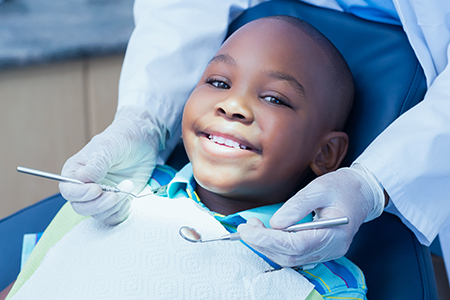Existing Patients
(740) 393-2161
New Patients
(740) 200-4777

At Brian Howe DDS, Family Dentistry, we believe a child's smile deserves careful attention from the very beginning. Pediatric dental care is about more than cleaning teeth — it's a partnership with families to build habits, prevent problems, and support healthy growth at every stage of childhood.

The earliest dental visits set the tone for a lifetime of good oral health. We encourage parents to introduce children to the dental office in a relaxed, positive way so routine care becomes familiar rather than frightening. Early visits focus on simple, reassuring steps: a gentle exam, age-appropriate cleaning, and practical guidance for parents on daily hygiene.
Establishing effective brushing and flossing routines is a collaborative process. Our team demonstrates techniques for each developmental stage, explains how much toothpaste to use, and suggests tools — soft brushes, flossers, and fluoride options — that make daily care achievable. We also review common habits, like thumb sucking or pacifier use, and offer strategies for helping children transition away from behaviors that can affect dental development.
Prevention is central to pediatric dentistry. By identifying risk factors early and reinforcing good routines, we can reduce the likelihood of cavities and other problems that interrupt childhood activities. The goal is to help each child arrive at adulthood with a healthy, functional smile and confidence about caring for it.
A calming environment and clear communication make a big difference in how children experience dental care. We design appointments to be predictable and supportive: clinicians explain what will happen at each step, staff use child-friendly language, and visits progress at a pace that matches the child’s comfort level. This approach helps reduce anxiety and builds trust over time.
For children who are nervous or have special needs, there are behavior-management techniques suited to their individual situation. Our emphasis is always on safe, compassionate care that protects a child’s physical and emotional well-being. When more help is needed to complete treatment comfortably, we discuss appropriate options and create a plan that prioritizes the child’s safety and dignity.
Parents are an essential part of every visit. We welcome caregivers to participate as much as they and their child prefer, and we provide practical tips so families leave appointments feeling more confident about home care between visits.

Routine exams give us the chance to evaluate more than just the teeth. Each checkup includes an assessment of gum health, jaw and bite alignment, and the overall pattern of facial growth. These observations help detect concerns early, whether they involve emerging cavities, alignment issues, or developmental differences that could benefit from timely intervention.
Dental radiographs are used selectively and only when they provide important diagnostic information. Modern digital imaging keeps exposure low while revealing details that can't be seen during a visual exam — like early decay between teeth or the position of developing permanent teeth. We explain why and when imaging is recommended so families can make informed choices.
A professional cleaning complements the exam by removing plaque and tartar in places a toothbrush may miss. Cleanings also provide an opportunity to reinforce good habits, answer questions about nutrition and sealants, and plan follow-up care when necessary.
There are several evidence-based measures that help protect children's teeth from decay. Fluoride treatments strengthen enamel and are applied in-office when appropriate for a child’s age and risk. Dental sealants form a durable barrier on molar chewing surfaces where decay often starts, especially useful once the permanent molars erupt.
We individualize preventive plans based on each child’s needs. Factors such as past cavities, diet, brushing frequency, and developmental considerations guide our recommendations. The aim is to reduce risk while keeping care simple and family-friendly.
When a restorative procedure is needed — for example, to treat a cavity — we prioritize approaches that preserve healthy tooth structure, reduce discomfort, and minimize future problems. Our team uses modern materials and techniques designed for longevity and comfort.
Start dental care early — clean gums, then brush as teeth appear.
Keep to a consistent brushing and flossing routine with age-appropriate tools.
Avoid putting babies to bed with bottles containing milk or juice.
Bring children for regular checkups and cleanings so problems are caught early.
Lead by example — children learn by watching how caregivers care for their own teeth.
Choose tooth-friendly snacks, limit sugary drinks, and emphasize water throughout the day.
Support children as they discontinue pacifier or thumb-sucking habits at appropriate ages.
Use a properly fitted mouthguard for sports to protect teeth and soft tissues.

Even before a child’s first birthday, the foundations of dental health are already forming. Baby teeth serve important functions: they enable speech, support nutrition, and hold space for permanent teeth. Early exams help ensure these teeth develop on track and give parents practical advice for teething, gentle cleaning, and appropriate toothpaste use.
Teething can be uncomfortable, and parents often appreciate simple, safe ways to soothe their child. Cold teething rings, gentle gum massage with a clean cloth, and careful monitoring are effective measures. If a parent is ever unsure or notices unusual swelling, fever, or persistent distress, calling the dental office for guidance is recommended.
If a primary tooth is lost prematurely, a space maintainer may be considered to preserve the position of neighboring teeth until the permanent tooth arrives. Our team will discuss options when any dental injury, early loss, or developmental concern arises.
As children transition into school years, their dental needs evolve. Permanent molars and premolars come in, dietary choices change, and activity levels — including sports — can increase the risk of dental injuries. Regular exams allow us to track growth, apply protective treatments like sealants, and advise on habits that support strong teeth.
We also keep an eye on bite development and jaw growth so that any orthodontic issues can be identified early. Many alignment problems are best addressed sooner rather than later; timely detection allows families to consider options at the right moment for predictable results.
When dental emergencies occur — a fractured tooth, a severe toothache, or a knocked-out tooth — quick, informed care can make a major difference in the outcome. Our office provides practical guidance for urgent situations and works to resolve problems promptly while minimizing discomfort.
Children’s faces and jaws change rapidly, and our regular assessments look for signs that orthodontic evaluation may be helpful. If early intervention could simplify later treatment or improve jaw function, we’ll outline next steps and coordinate care with specialists when appropriate.
A balanced diet supports strong teeth and overall development. Frequent snacking on sticky, sugary foods raises the risk of cavities, while meals that include calcium-rich and fiber-rich choices support healthy teeth and gums. We provide straightforward guidance so families can make sustainable choices for school lunches, snacks, and routines at home.
Pediatric dentistry at our practice focuses on prevention, comfort, and clear communication. Our goal is to guide each child through milestones with care plans tailored to their growth and needs, helping families feel confident about daily hygiene, nutrition, and when to seek care.
We believe effective dental care blends clinical skill with a warm, child-centered approach. By building strong habits early and addressing issues promptly, we help children keep their smiles healthy and functional as they grow.
If you’d like to learn more about pediatric dental care or discuss your child’s needs, please contact us for more information.
Children should have their first dental visit by their first birthday or within six months of the eruption of the first tooth. Early visits allow the dentist to assess development, spot potential concerns, and coach caregivers on gentle cleaning techniques and feeding practices that affect oral health. Establishing a dental home early helps normalize care and reduces the likelihood of anxiety at future appointments.
At the first visit the clinician will perform a basic exam, check for proper eruption and alignment, and review habits such as bottle or pacifier use. Parents receive practical guidance on toothbrushing, fluoride use appropriate for the child’s age, and ways to prevent early childhood caries. The visit is short and focused on making the experience positive for both child and caregiver.
Most children benefit from dental checkups every six months, but frequency may vary based on individual risk factors such as prior cavities, dietary habits, or medical conditions. Regular visits allow the team to monitor growth, clean areas that are difficult to reach at home, and apply preventive treatments when indicated. Consistent recall appointments help catch small problems early and keep care on track as the child grows.
The dental team tailors the recall interval to each child’s needs and will explain their recommendation during the appointment. Families with newly erupted permanent molars, high decay risk, or special medical considerations may be asked to return more frequently. Clear communication ensures caregivers understand the purpose of the schedule and how to support oral health between visits.
A routine exam includes a visual evaluation of the teeth, gums, and oral tissues as well as an assessment of jaw growth and bite development. The clinician looks for early signs of decay, checks for eruption patterns, and evaluates habits that can influence dental development, such as thumb sucking. When appropriate, selective digital radiographs are recommended to reveal issues not visible on the surface, and the team explains the rationale before imaging is taken.
Professional cleaning is often part of the visit and focuses on removing plaque and tartar in areas a toothbrush may miss while reinforcing effective home care techniques. The visit also includes age-appropriate education about diet, fluoride, and sealants when indicated. Care plans are individualized so families leave with clear, practical next steps tailored to their child.
Preventive care commonly includes topical fluoride treatments and dental sealants to reduce the risk of decay. Fluoride strengthens enamel and is applied in-office when a child’s risk profile suggests benefit, while sealants create a protective barrier on the chewing surfaces of permanent molars once they erupt. Both treatments are evidence-based measures that complement daily brushing and a tooth-friendly diet.
The dental team determines the need for these measures based on each child’s history of cavities, oral hygiene habits, and dietary patterns. Recommendations are personalized so families understand the expected benefits and how these interventions fit into an overall prevention strategy. Ongoing reinforcement of brushing, flossing, and nutrition remains central to maintaining results.
Creating a calm, predictable environment is a priority when caring for anxious children or those with special needs, and appointments are structured to match each child’s comfort level. Clinicians use clear, child-friendly language, demonstrate instruments, and proceed gradually so the child feels safe and respected. Behavioral techniques, visual supports, and caregiver involvement are common strategies to reduce fear and increase cooperation.
For some children additional accommodations or behavior guidance may be recommended to ensure safe, effective care. The team discusses options with families, explains what to expect, and coordinates with other providers when necessary to support the child’s overall well-being. The goal is always compassionate care that preserves dignity and minimizes distress.
Consistent daily routines are the foundation of strong oral health; parents should brush their child’s teeth twice a day with a soft brush and age-appropriate toothpaste and add flossing as contacts form between teeth. Modeling good habits, supervising brushing until a child has the manual dexterity to do a thorough job, and limiting sugary snacks and drinks are practical steps that make a measurable difference. Regular mealtime structure and encouraging water instead of sweetened beverages also protect developing enamel.
Caregivers benefit from simple, specific guidance tailored to their child’s age, and the dental team can demonstrate techniques during visits. Using positive reinforcement, making oral care part of the daily routine, and keeping toothbrushes and floss accessible increase adherence. If pacifier or thumb-sucking habits persist, the office can suggest gradual strategies to support cessation at appropriate ages.
Teething can cause discomfort but is usually manageable with safe measures such as chilled (not frozen) teething rings, gentle gum massage with a clean cloth, and offering comfort during episodes of fussiness. Parents should clean infant gums after feedings and begin wiping tooth-bearing areas as teeth appear; once teeth erupt, brushing with a soft brush is recommended. Avoiding prolonged exposure to sugary liquids and not putting babies to bed with bottles of milk or juice are important preventive steps.
If a caregiver notices excessive swelling, fever, or unusual symptoms during teething, contacting the dental office for guidance is appropriate. Early care also includes counseling on appropriate toothpaste amounts for young children and when to begin supervised brushing. These simple practices help preserve primary teeth, which are essential for nutrition, speech development, and holding space for permanent teeth.
In a dental emergency—such as a knocked-out tooth, severe toothache, or a fractured tooth—quick, calm action improves the chance of a favorable outcome. For a permanent tooth that has been knocked out, try to locate it, handle it by the crown (not the root), rinse gently if dirty, and keep it moist while seeking immediate dental care; timely replantation can sometimes save the tooth. For pain or swelling, contact the dental office promptly so the team can triage the situation and recommend next steps to manage symptoms and protect the child.
The office provides guidance on first-aid measures, when to come in for same-day care, and how to stabilize injuries safely at home until professional treatment is available. Keeping a current emergency plan and knowing the practice’s instructions for urgent situations helps caregivers act quickly. Preventive measures like mouthguards and supervision during activities reduce the risk of many common injuries.
Orthodontic evaluation is often considered by early school age or around age 7, when the first permanent molars and incisors have erupted and growth patterns become clearer. Regular dental visits include monitoring of jaw development and bite relationships so the team can identify early signs that may benefit from timely orthodontic assessment. Early detection does not always mean immediate treatment, but it allows the dentist to plan and coordinate care so interventions, if needed, occur at the most effective time.
If the dentist observes issues such as crossbite, severe crowding, or asymmetric jaw growth, they will discuss possible next steps and, when appropriate, refer to an orthodontic specialist. Collaborative care ensures families receive recommendations that balance growth, function, and long-term outcome. Clear explanations help caregivers understand why monitoring matters and what to expect as the child develops.
Children involved in contact or collision sports should wear a properly fitted mouthguard to protect teeth, soft tissues, and jaw structures from injury. A custom mouthguard made by a dental professional offers the best fit, comfort, and protection compared with generic store-bought options, and the team can assess fit and recommend the most appropriate design. Using a mouthguard consistently during practices and games significantly reduces the risk of dental trauma.
In addition to mouthguards, caregivers should encourage protective equipment suitable for the sport, safe play practices, and supervision that minimizes hazardous behavior. If a dental injury does occur despite precautions, prompt evaluation helps determine necessary care and maximizes the chance of preserving the tooth and surrounding structures. The office can provide guidance on prevention and steps to take after an injury.
Pediatric dental care at our office combines prevention, growth monitoring, and age-appropriate education to guide children through key developmental milestones with minimal disruption. Our clinicians emphasize evidence-based interventions like fluoride applications and sealants, personalized home-care coaching, and regular assessments of bite and jaw growth so issues are addressed early. This comprehensive approach aims to help children maintain healthy, functional smiles into adulthood.
Families in Mount Vernon rely on our team to provide clear explanations, practical tools, and compassionate care that respects each child’s needs and comfort level. By building a trusting relationship with caregivers and offering consistent, individualized recommendations, we support lifelong habits that promote oral and overall health. Parents who have questions about their child’s care are encouraged to contact the office for guidance tailored to their family.
Our friendly and knowledgeable team is always ready to assist you. You can reach us by phone at (740) 393-2161 or by using the convenient contact form below. If you submit the form, a member of our staff will respond within 24–48 hours.
Please do not use this form for emergencies or for appointment-related matters.
